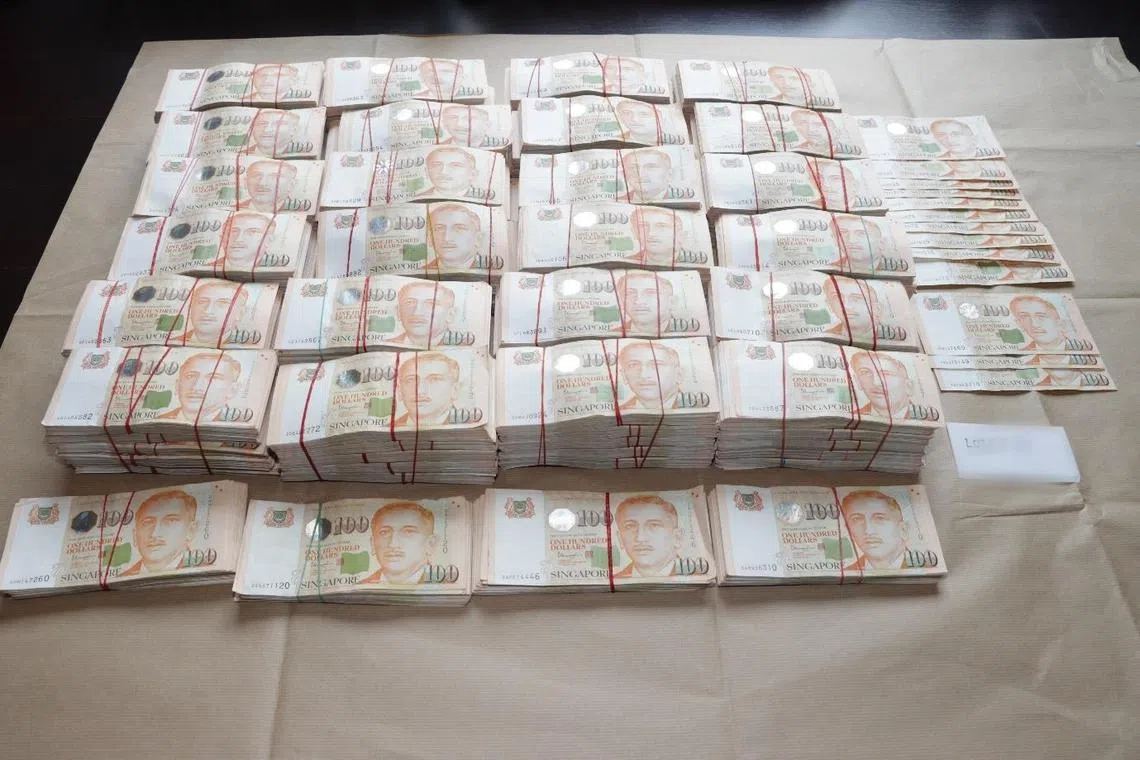MHA to strengthen laws to detect and prosecute money launderers more effectively: Shanmugam
Sign up now: Get ST's newsletters delivered to your inbox

Five foreigners in the $3 billion money laundering case have been prosecuted under the Corruption, Drug Trafficking and Other Serious Crimes (Confiscation of Benefits) Act.
PHOTO: SINGAPORE POLICE FORCE
Follow topic:
SINGAPORE - The Ministry of Home Affairs will be strengthening the law to enhance the authorities’ abilities to track down and prosecute money launderers.
This will be done through a Bill to amend the Corruption, Drug Trafficking and Other Serious Crimes (Confiscation of Benefits) Act (CDSA), which five foreigners in the $3 billion money laundering case
The Bill will also allow sectoral regulators to access suspicious transaction reports filed by their regulated entities, to better detect money laundering activities.
Home Affairs Minister K. Shanmugam said this in a written parliamentary reply on May 8 in response to a question by Progress Singapore Party Non-Constituency MP Leong Mun Wai.
Mr Leong had asked if the sentences for offences under the CDSA have sufficiently deterred individuals from engaging in money laundering, and if the Government would consider strengthening the sentencing regime.
In response, Mr Shanmugam said that under the CDSA, offenders can be jailed from three to 10 years, fined between $150,000 and $500,000, or both. This depends on the nature of the money laundering offences, he said.
“This is similar to the penalties for other serious offences, like cheating and forgery. It is also comparable with the sentencing regimes in other jurisdictions such as Japan, Switzerland, New Zealand, Germany and France,” he added.
In August 2023, 10 foreigners were arrested in islandwide raids led by the Commercial Affairs Department, and over $3 billion in cash and assets have been seized
In April, five of the 10 foreigners in the probe
Addressing this, Mr Shanmugam said: “So far, the sentences meted out by the Singapore Courts have been comparable to those in other jurisdictions.
“And, like other foreigners convicted of serious offences in Singapore, these offenders will be deported after serving their sentence and will be banned from re-entering Singapore.”
On May 6, Su Wenqiang and Wang Baosen, both 32, were deported to Cambodia and will be barred from re-entering Singapore.
Mr Shanmugam said the CDSA, which was reviewed and updated twice in recent years, sets out a range of penalties.
The courts will then consider the appropriate penalties to be imposed, based on the specific facts of the case. These factors may include the amount of money laundered, the length of the offending conduct and the extent of the abuse of Singapore’s financial system.
Mr Shanmugam said that with respect to the money laundering case, the courts would have likely taken into consideration the offenders’ relatively early plea of guilt, which has saved public resources by avoiding long-drawn court processes. The courts would have also considered the foreigners’ agreement for most of the seized funds to be forfeited to the state.
All five men who have been sentenced so far have agreed to forfeit assets to the state.
Su Haijin, 41, forfeited assets worth around $165 million forfeited assets worth about $118 million. forfeited about $65 million, surrendered assets worth around $8 million, gave up assets worth more than $5.9 million.
Mr Shanmugam said the risk of imprisonment is an important deterrent against money laundering, adding: “Asset forfeiture is another crucial tool in our arsenal against white-collar crime, as it deprives criminals of their illicit proceeds, and hence acts as a deterrence to laundering their monies here.
“But the biggest deterrent of all, is the prospect of being caught.”
The minister said that globally, cases of money laundering are very difficult to uncover.
“There are not many cases as big as the $3 billion money laundering case, which was the result of extensive intelligence probes, and painstaking piecing together of disparate types of information,” he said.
“This is not because there are no such monies being laundered in other jurisdictions. Rather, criminals hide their tracks very carefully. We know this from our foreign law enforcement counterparts as well.”
He highlighted that the money laundering case has shown Singapore’s ability to detect suspicious individuals and activities.
“And once we become aware of them, we have the resolve and capabilities to track the criminals down,” he added.
On April 2, Cambodian national Su Wenqiang was sentenced to 13 months’ jail after he pleaded guilty to two counts of money laundering.
Cypriot national Su Haijin, who had jumped from the second-floor balcony of a good-class bungalow during a police raid, was sentenced to 14 months’ jail on April 4.
Chinese national Wang Baosen was sentenced to 13 months’ jail after pleading guilty on April 16 to two charges of money laundering.
On April 29, Cambodian national Su Baolin was sentenced to 14 months’ jail after admitting to three charges, including two for money laundering.
Chinese national Zhang Ruijin was on April 30 sentenced to 15 months’ jail – the highest jail term meted out in the case so far. He pleaded guilty to one money laundering charge and two forgery charges.
Of the five that have yet to be dealt with, two have had their dates set to plead guilty in court.
Vang Shuiming, 43, is expected to plead guilty on May 14, while Chen Qingyuan, 34, has a court date set on May 23 for him to admit to his charges.


